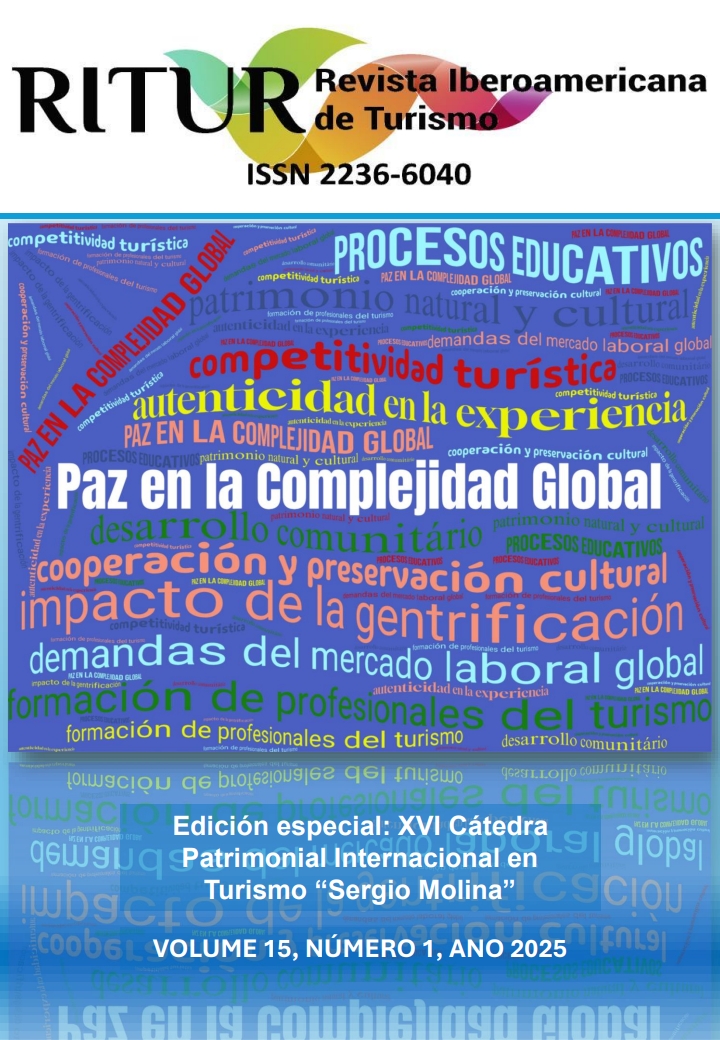Integración de herramientas de análisis de sentimiento para el fortalecimiento de la profesionalización en turismo
Sem subtítulo
DOI:
https://doi.org/10.28998/ritur.V15.N1.A2025.pp4-20.18668Palavras-chave:
Análise de sentimento, Profissionalização, TurismoResumo
Este estudio explora el uso de herramientas de análisis de sentimiento como un recurso innovador para la formación de profesionales en turismo. Con el crecimiento del sector en la era digital, las plataformas sociales generan una gran cantidad de datos que reflejan percepciones, emociones y comportamientos de los consumidores. Este análisis brinda a los estudiantes de turismo la oportunidad de desarrollar habilidades analíticas y comprender tendencias del mercado. A través de un enfoque metodológico mixto, se analizaron publicaciones en redes sociales sobre destinos turísticos con herramientas de procesamiento de lenguaje natural y machine learning. Los resultados indican que incorporar estas tecnologías en el plan de estudios mejora la capacidad de los estudiantes para interpretar y actuar sobre las preferencias de los consumidores. Además, los estudiantes reportaron un mayor entendimiento de las dinámicas del mercado turístico digital. Este artículo concluye que el análisis de sentimiento enriquece la formación académica y prepara a los futuros profesionales del turismo para los desafíos del entorno digital actual.
Downloads
Referências
Balula, A. Moreira, G., de Freitas, A.A., Kastenholz, E., Breda, Z. y Eusébio C. (2019).
Digital transformation in tourism education. Conference: Tourism in Southern and Eastern Europe: Creating Innovative Tourism. DOI: 10.20867/tosee.05.45
Bednarska, M., y Olszewki (2013). Students’ Attitudes Towards Career in the Tourism
Industry – Implications for Tacit Knowledge Management. Entrepreneurship in Tourism and Sport, M. Bednarczyk, J. Gancarczyk (Eds.). 9(1): 119- 134. DOI: 10.7341/2013917
Berezina, K., y Bilgihan, A., Cobanoglu, C., & Okumus, F. (2016). Understanding satisfied
and dissatisfied hotel customers: Text mining of online hotel reviews. Journal of Hospitality Marketing & Management, 25(1), 1-24. DOI: 10.1080/19368623.2015.983631
Buhalis, D., y Law, R. (2008). Progress in information technology and tourism management:
years on and 10 years after the Internet—The state of eTourism research. Tourism Management, 29(4), 609-623. 2008. https://doi.org/10.1016/j.tourman.2008.01.005
Buhalis, D., y Sinarta, Y. (2019) Real-time co-creation and nowness service: Lessons from
tourism and hospitality. Journal of Travel & Tourism Marketing, 36(5), 563-582. https://doi.org/10.1080/10548408.2019.1592059
Chen, M. S., Chiang, R. H., & Storey, V. C. (2012). Business intelligence and analytics: From
big data to big impact. MIS Quarterly, 36(4), 1165-1188. https://doi.org/10.2307/41703503
Choi, H., Ok, C., & Lee, S. (2023). The influence of online reviews on consumer decision
making in the hotel industry Journal of Data Acquisition and Processing, Vol. 38 (3) https://sjcjycl.cn/DOI: 10.5281/zenodo.98549597
Filieri, R., Alguezaui, S., & McLeay, F. (2015). Why do travellers trust TripAdvisor?
Antecedents of trust towards consumer-generated media and its influence on recommendation adoption and word of mouth. Tourism Management, 51, 174-185. https://doi.org/10.1016/j.tourman.2015.05.007
Gretzel, U. (2011). Intelligent systems in tourism: A social science perspective. Annals of
Tourism Research, 38(3), 757-779. http://dx.doi.org/10.1016/j.annals.2011.04.014
Gretzel, U., Yuan Y. L. Fesenmaier D. (2000). Preparing for the New Economy: Advertising
Strategies and Change in Destination Marketing Organizations. Journal of travel research. Vol 32, Issue 2. https://doi.org/10.1177/0047287500039002
Liu, B., y Zhang, L. (2012). A survey of opinion mining and sentiment analysis. Mining
Text Data, https://link.springer.com/chapter/10.1007/978-1-4614-3223-4_13
Munar, A. M., y Jacobsen, J. K. S. (2014). Motivations for sharing tourism experiences
through social media. Tourism Management, 43, 46-54. 2014. https://doi.org/10.1016/j.tourman.2014.01.012
Pang, B., y Lee, L. (2008). Opinion mining and sentiment analysis. Foundations and
Trends in Information Retrieval, 2(1–2), 1-135. 2008. Disponible en: https://www.cs.cornell.edu/home/llee/omsa/omsa.pdf
Rafiq, S., Iqbal., y Afzal, A. (2024). The impact of digital tools on student engagement
and learning outcomes: An empirical study. Al- Mahdi Research Journal, 5(4), https://www.jstor.org/stable/23613046
Sigala, M. (2018). New technologies in tourism: From multi-disciplinary to anti-disciplinary
advances and trajectories. Tourism Management Perspectives, 25, 151-155. https://doi.org/10.1016/j.tmp.2017.12.003
Waramontri, R (2020). Impact of social media on tourism education. E3S Web of
Conferences 210(1):22008 DOI: 10.1051/e3sconf/202021022008
Xiang, Z., y Fesenmaier, D. (2017). Big data analytics, tourism design and smart tourism.
Tourism Management, 58, 178-186. 2017. DOI:10.1007/978-3-319-44263-1_17
Xiang, Z., Schwartz, Z., Gerdes, J. H., & Uysal, M. (2015). What can big data and text
analytics tell us about hotel guest experience and satisfaction? International Journal of Hospitality Management, 44, 120-130. https://doi.org/10.1016/j.ijhm.2014.10.013
Xie, K. L., Zhang, Z., y Zhang, Z. The business value of online consumer reviews and
management response to hotel performance. International Journal of Hospitality Management, 43, 1-12. 2014. Disponible en: https://doi.org/10.1016/j.ijhm.2014.07.007
Xu, F., Weber, J., & Buhalis, D. (2013). Gamification in tourism. Information and
Communication Technologies in Tourism, 525-538. 2017. DOI: 10.1007/978-3-319-03973-2_38
Ye, Q., Law, R., Gu, B., y Chen, W. (2009). The influence of user-generated content on
traveler behavior: An empirical investigation on the effects of e-word-of-mouth to hotel online bookings. Computers in Human Behavior, 27(2), 634-639. https://doi.org/10.1016/j.chb.2010.04.014
Zhao, J., Lui, K., y Xu, L. (2016). Sentiment Analysis: Mining Opinions, Sentiments, and
Emotions. Computational Linguistics 42(3) 595- 598. https://doi.org/10.1162/COLI_r_00259
Downloads
Publicado
Como Citar
Edição
Seção
Licença
Copyright (c) 2025 RITUR - Revista Iberoamericana de Turismo

Este trabalho está licenciado sob uma licença Creative Commons Attribution-NonCommercial-ShareAlike 4.0 International License.
Autores que publicam nesta revista concordam com os seguintes termos:
- Os Autores mantém os direitos autorais e concedem à revista o direito de publicação simultaneamente disponibilizada de acordo com uma Licença Creative Commons 4.0 Brasil, permitindo o compartilhamento sem fins lucrativos de sua obra pelo seu uso/citação de modo referenciado (com reconhecimento da autoria e publicação nesta revista).



















